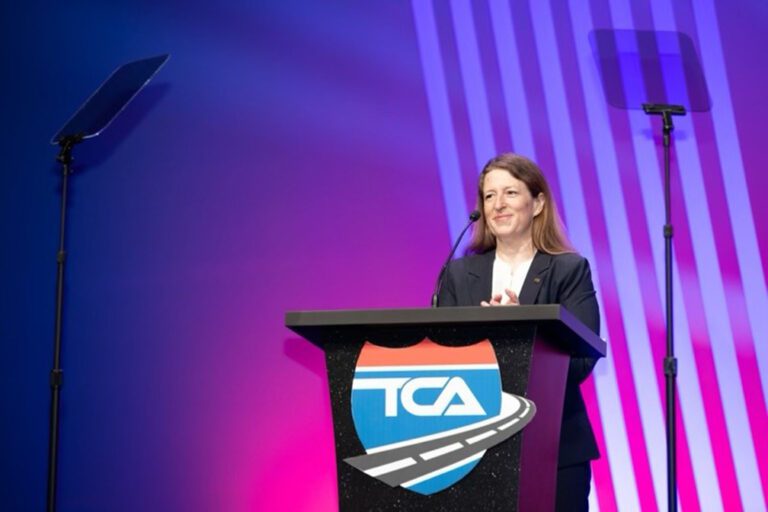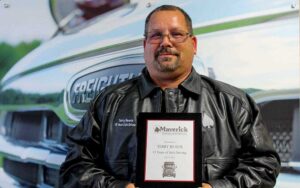ORLANDO, Fla. — Federal Motor Carrier Safety Administration (FMCSA) Administrator Robin Hutcheson didn’t mince words about her agency’s backing of the trucking industry when she addressed members of the Truckload Carriers Association on March 6 at their annual conference in the heart of Florida.
“What drivers are doing for the American public is extraordinary; they are essential workers. They are keeping America moving every day,” Hutcheson said, noting that vital industry issues, such as a lack of safe parking, are at the forefront of FMCSA concerns.
On truck parking, Hutcheson pointed to the Bipartisan Infrastructure Plan, which has made millions of dollars in grant funds available to states such as Tennessee and Florida to help build more safe truck parking sites.
“We are pushing hard to progress on this issue,” she said. “We care deeply about truck parking.”
According to the American Trucking Associations, more than 98% percent of drivers report problems finding safe parking, burning more than 56 minutes of available drive-time every day to find it. That wasted time amounts to a $5,500 loss in annual compensation — or a 12% pay cut.
Hutcheson noted that her boss, Transportation Secretary Pete Buttigieg, has also pledged to make truck parking a priority.
Last year, Buttigieg acknowledged during a hearing of the Senate’s Environment and Public Works Senate Committee that a lack of safe truck parking is a serious issue that must be addressed.
“If you talk with any truck driver, it’s not only an issue of convenience, it’s an issue of safety,” Buttigieg said. “And, I might add, with the idling that goes on, it’s even an issue of emissions.”
Switching topics, Hutcheson outlined some of what President Biden’s Trucking Action Plan will entail for the trucking industry.
For example, more than $44 million in grants that will enhance road safety and make the process to obtain a Commercial Driver’s License (CDL) more efficient have been made available thanks to the plan, Hutcheson said.
Hutcheson added that safety improvements move forward another chief FMCSA goal: Zero highway fatalities.
“We made a list of actions that we need to take, and we called you, our partners, into action,” she said. “A safer commercial motor vehicle makes everyone safer. Our work is rooted in safer people and safer speeds and vehicles.”
Some of those actions include proposals to require speed limiters and automatic braking technologies in big rigs. The two issues will be addressed later this year.
A total of 4,965 people died in large-truck crashes in 2020, according to the National Safety Council. The number of deaths decreased 1% from 2019 but is still up 31% since 2011. The majority of deaths in large-truck crashes are occupants of other vehicles (71%), followed by truck occupants (17%) and non-occupants, primarily pedestrians and bicyclists (12%).
“I can’t think of another place in modern world where we would accept people dying in work place,” Hutcheson said. “Our work toward fulfilling our mission begins with understanding root cause of unsafe driving. This leads us to the driver.”
TCA President Jim Ward, in comments on the speed limiter issue filed on the Federal Register, wrote that “views the decision to mandate speed limiters as a sensible next step in the ongoing effort to reduce accidents on our roadways and improve safety in the industry.”
In addition, “all Class 8 and 7 trucks manufactured after 1992 should utilize secure and reliable devices that limit the maximum speed to 65 miles per hour, or 70 miles per hour if the vehicles are also equipped with adaptive cruise control and automatic emergency braking,” Ward wrote.
“The current technology allows motor carriers considerable flexibility when deploying speed limiting devices to accommodate speed differentials among vehicles,” he continued. “In fact, some carriers have established implementation models that tailor flexibility based on job performance and safe driving.”
Hutcheson said that while the majority of drivers are safe, it’s time to look at those who cause accidents due to unsafe practices, such as driving while tired, intoxicated or distracted.
“We are asking deeper questions about why do drivers become unsafe in the first place,” she said. “It’s about going to the headwaters of a problem. We can say it’s because they are speeding, but why were they speeding? Was it because of the hours they have to wait sitting at the loading dock and not being paid? Were they hurrying to get to their destination? We can say they are tired, but why are they tired? Did they drive around for hours to find a place to park? Or did they take on extra loads because their carrier doesn’t have enough drivers? If they are distracted, are they not taking breaks so they can catch up with their families, friends and children? Do they feel unsafe? Have they been harassed, robbed or attacked?”
In her speech, Hutcheson also thanked women drivers, who make up only 7% of those piloting big rigs up and down America’s highways.
She called women “trailblazers,” adding that “It’s not easy. We have to make space and opportunity for women to enter and grow in this industry.”
Tying her speech back to the TCA, Hutcheson said that the organization shares “a lot of the same goals” with the FMCSA, noting that “people are so much more acutely aware where their goods come from (today).”
“In everyday conversations, when I describe my work, my friends and family are conversing at a level that is right out of trade magazines that we all read everyday,” she said, joking that her mom understands spot rates. “There is such a consciousness about the work that you all do. Let’s take a moment to seize this opportunity. We are in the midst of change.”
Born in Pine Bluff, Arkansas, and raised in East Texas, John Worthen returned to his home state to attend college in 1998 and decided to make his life in The Natural State. Worthen is a 20-year veteran of the journalism industry and has covered just about every topic there is. He has a passion for writing and telling stories. He has worked as a beat reporter and bureau chief for a statewide newspaper and as managing editor of a regional newspaper in Arkansas. Additionally, Worthen has been a prolific freelance journalist for two decades, and has been published in several travel magazines and on travel websites.











